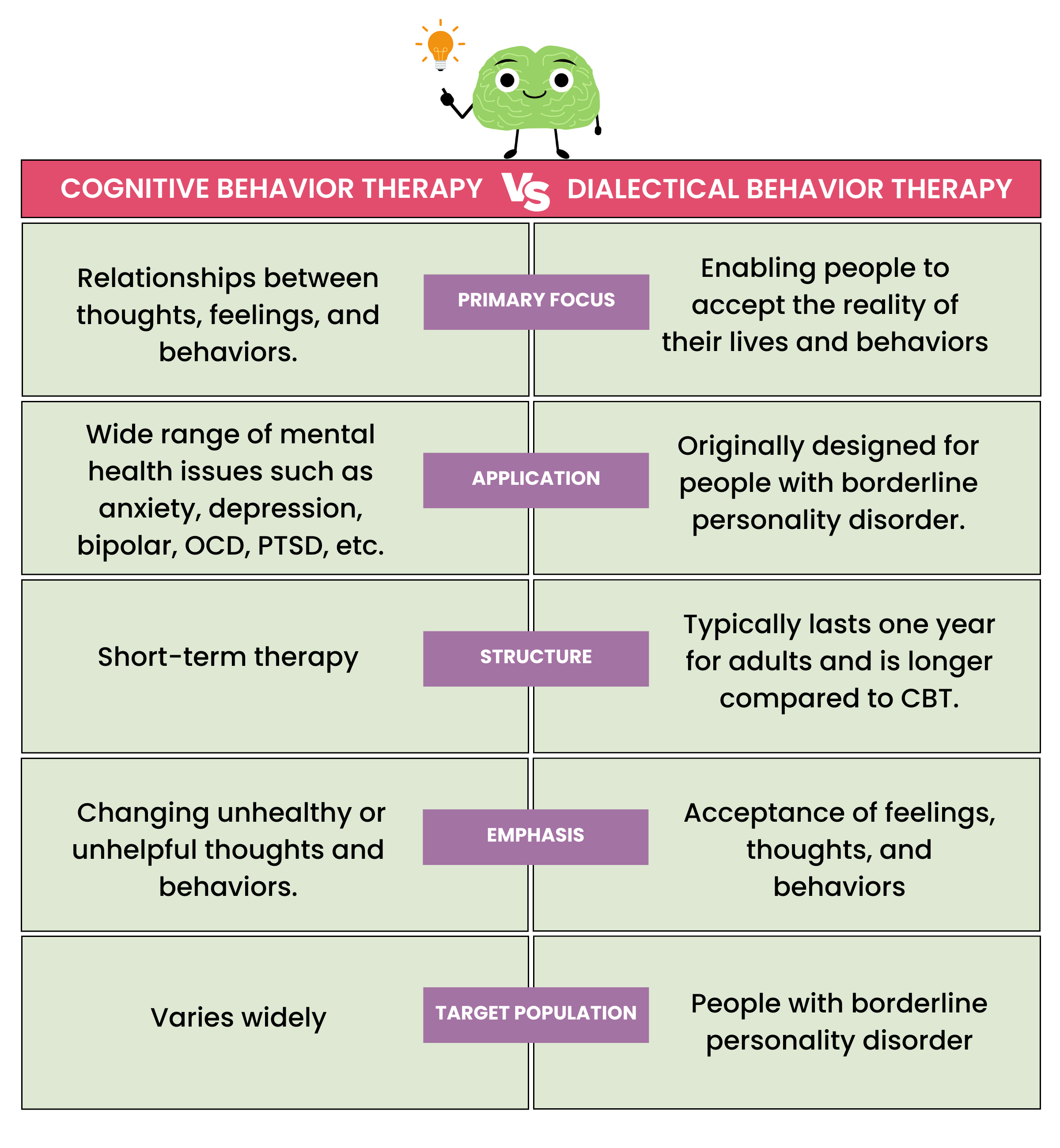DBT London: Where Hope and Recovery Intersect for Lasting Change
DBT London: Where Hope and Recovery Intersect for Lasting Change
Blog Article
Using the Power of Dialectical Behavior Treatment (DBT) Providers for Lasting Emotional Equilibrium and Improved Relationships
In a world where psychological health and preserving healthy and balanced connections are crucial components of a satisfying life, the use of Dialectical Behavior Treatment (DBT) solutions has emerged as a beacon of hope for many people. The evidence-based and structured strategy of DBT uses a path in the direction of sustainable emotional balance and enhanced interactions with others.

Recognizing the Core Principles of DBT
Dialectical Behavior Modification (DBT) is founded upon a collection of core principles that underpin its restorative strategy to advertising psychological equilibrium and psychological well-being. Among the fundamental concepts of DBT is dialectics, which stresses the synthesis of seemingly contrary concepts to reach a more well balanced viewpoint. This entails acknowledging and accepting the oppositions and tensions within oneself, bring about a higher feeling of harmony and understanding. Mindfulness is one more core concept of DBT, concentrating on being completely existing in the moment without judgment. By growing mindfulness, individuals can develop an increased recognition of their habits, thoughts, and emotions, enabling greater self-regulation and emotional control.

Validation is additionally important to DBT, stressing the significance of approving and recognizing one's experiences and feelings as valid. With validation, people can discover to navigate their sensations with concern and understanding, fostering self-acceptance and emotional growth. Lastly, behaviorism plays an important duty in DBT, emphasizing the adjustment of maladaptive behaviors via support and skill-building. By including these core concepts into treatment, DBT provides a effective and thorough method to promoting psychological health and emotional strength.
Developing Emotional Law Skills
Emotional law skills are essential components of Dialectical Behavior modification (DBT) that make it possible for people to properly manage their feelings and browse tough circumstances with durability. These abilities encompass the capability to recognize and understand one's emotions, tolerate distress, regulate intense feelings, and act according to individual worths also when faced with emotional chaos. Establishing psychological regulation abilities involves finding out mindfulness techniques to remain existing in the moment, understanding the triggers that lead to psychological dysregulation, and implementing coping approaches to modulate psychological responses.

Enhancing Interpersonal Performance
Improving communication abilities and fostering meaningful connections with others are indispensable aspects of developing social efficiency within the framework of Dialectical Behavior Therapy (DBT) In DBT, enhancing social efficiency includes learning how to assertively share one's needs and boundaries while likewise considering the requirements and borders of others. This skill is vital Our site for lessening and constructing healthy and balanced connections problem. DBT educates people just how to connect effectively, browse interpersonal challenges, and develop methods for resolving problems in a positive manner.
One key element of boosting social performance in DBT is finding out to identify and take care of feelings in social communications. DBT London. By increasing emotional understanding, individuals can respond to others in a more compassionate and understanding method. In addition, DBT emphasizes the significance of exercising mindfulness in social partnerships, urging people to be present in their interactions Home Page and fully involve with others
Exercising Mindfulness Techniques
Creating a regular mindfulness technique is vital for people going through Dialectical Habits Therapy (DBT) to grow emotional policy and enhance their interpersonal effectiveness. Mindfulness strategies, a core element of DBT, involve paying focus to the here and now minute without judgment. Through mindfulness, individuals can end up being much more familiar with their thoughts, emotions, and physical feelings, allowing them to reply to scenarios with better clearness and control.
One secret mindfulness technique made use of in DBT is mindfulness meditation. This technique includes focusing on the breath or a specific object while allowing and recognizing go of any type of disruptive thoughts. By integrating mindfulness reflection into their everyday routine, people can educate their minds to stay present and decrease sensitivity to stressors.
Another important aspect of exercising mindfulness in DBT is the principle of extreme acceptance. Radical approval involves completely welcoming reality as it is, also when it is hard or uncomfortable. By approving the present moment without judgment, people can reduce their suffering and include positive modification.
Using DBT Techniques in Life
Building upon the foundation of mindfulness strategies such as meditation and radical acceptance, individuals can integrate DBT approaches into their everyday lives to foster psychological equilibrium and improve their interpersonal skills. Additionally, social efficiency skills instructed in DBT can assist individuals connect their needs assertively, established borders, and maintain healthy and balanced connections. By regularly using these DBT methods in daily life, people can experience sustainable psychological balance and enhance their general well-being.
Verdict

Emotional policy abilities are important parts of Dialectical Habits Therapy (DBT) that make it possible for individuals to properly manage their feelings and navigate challenging scenarios with resilience.Via DBT services, people can cultivate a much deeper understanding of their emotions, recognize patterns of actions that add to psychological distress, and acquire practical tools to regulate their feelings constructively.Establishing a constant mindfulness method is vital for people undergoing Dialectical Behavior Therapy (DBT) to cultivate psychological regulation and boost their interpersonal efficiency.Building upon the foundation of mindfulness strategies such as meditation and radical acceptance, people can incorporate DBT methods right into their day-to-day lives to promote psychological balance and boost their interpersonal abilities. By comprehending the core concepts of DBT, establishing psychological law skills, improving interpersonal performance, exercising mindfulness techniques, and using DBT techniques in daily life, individuals can experience substantial enhancements in their overall wellness and partnerships.
Report this page